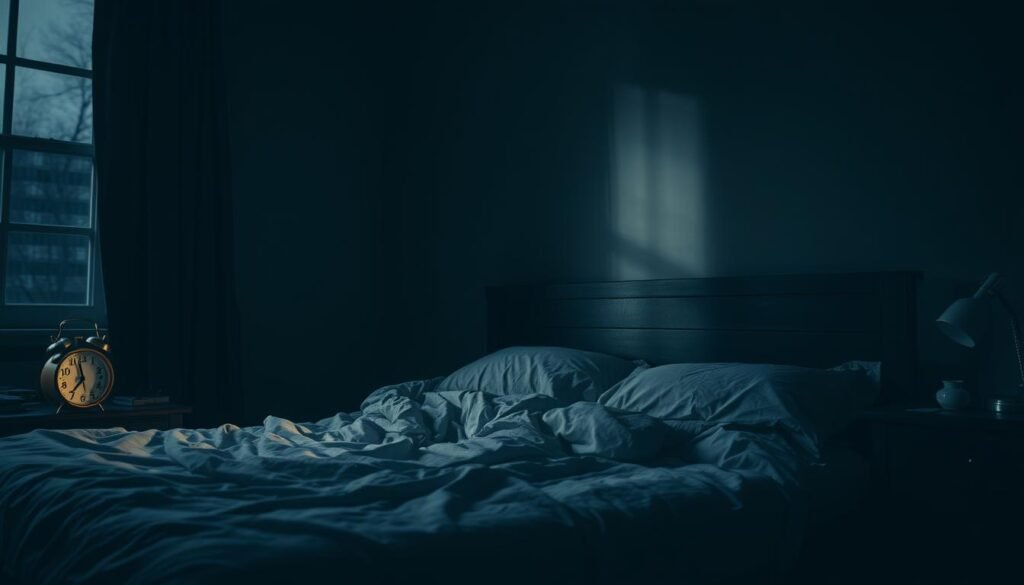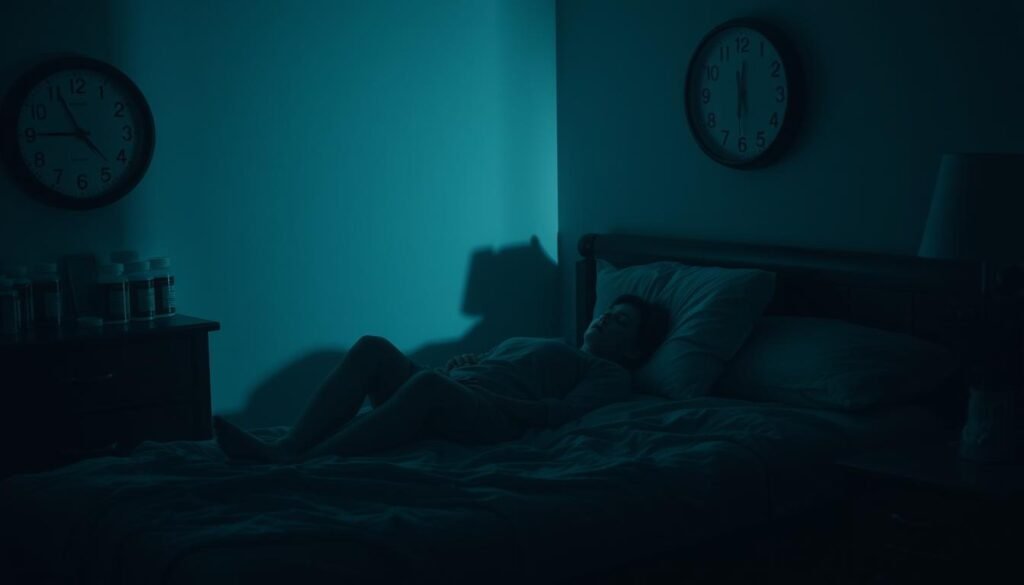About 40% of men over 45 have low testosterone levels. This can greatly affect their overall health. Testosterone is key for good physical health and for controlling sleep. Low levels can cause sleep problems. This leads to tiredness, mood swings, and more hormonal issues.
This article looks at how low testosterone messes with sleep. We will see how hormones and sleep quality are connected. We will talk about what’s a normal testosterone level, why levels can drop, and how to sleep better. This will help you understand an important part of your health.
Key Takeaways
- Low testosterone levels can significantly disrupt normal sleep patterns.
- Adequate sleep is essential for maintaining optimal testosterone production.
- Sleep disturbances may exacerbate symptoms of low testosterone.
- Healthy sleep hygiene can support hormonal balance.
- Consulting a healthcare professional is vital for addressing sleep-related hormonal issues.
The Importance of Testosterone in Sleep Regulation
Testosterone is key in sleep control and overall health. It impacts mood, energy, and sleep cycles. Testosterone levels reach their peak during REM sleep. This phase is vital for brain health and thinking abilities.
Low testosterone is tied to sleep issues. People with low levels may take longer to fall asleep again after waking. They might wake up often at night and get less deep sleep. This can start a cycle of tiredness and lower brain function, making sleep issues worse.
Too much body fat, especially in the belly area, can lower testosterone. This makes sleep problems worse. Conditions like sleep apnea can also reduce testosterone, harming sleep quality further. Knowing these links helps tackle hormonal and sleep issues. Using effective strategies can improve sleep and health.
What Are Normal Testosterone Levels?
It’s important to know what normal testosterone levels are. This tells us if there could be hormonal problems. Both men and women have different levels that change as they get older. Testosterone is key for many body functions like mood and energy. If levels are too low, it can cause issues.
Differences Between Male and Female Testosterone Levels
Men have much higher testosterone than women. For men, normal ranges are 300 to 1,000 ng/dL. Women’s levels are between 15 to 70 ng/dL. Knowing these differences helps us understand each person’s hormonal health. Low levels for anyone can lead to health problems.
Normal Testosterone Levels Over Time
Testosterone decreases as people age. It’s highest in the 20s and then slowly goes down. Understanding these trends helps spot low testosterone early. This way, treatment can start sooner.
| Age Group | Normal Testosterone Levels (ng/dL) |
|---|---|
| Men (20s) | 300 – 1,000 |
| Men (30s) | 250 – 900 |
| Men (40s) | 220 – 800 |
| Women (20s) | 15 – 70 |
| Women (30s) | 10 – 60 |
| Women (40s) | 8 – 55 |
Understanding Low Testosterone Levels
Low testosterone means testosterone deficiency or hypogonadism. It’s when testosterone levels are below the normal range. Understanding it starts with knowing what low levels mean. It’s also key to know what causes this deficiency.
Defining Low Testosterone
Testosterone levels vary a lot from one person to another. Men’s normal range is 300-1,000 ng/dL, women’s is 15-70 ng/dL. Below these levels, it’s considered deficiency. This can cause many health problems and symptoms. Testosterone decreases by about 1-2% each year in men. Spotting this decline is vital to identifying low levels.
Common Causes of Low Testosterone Levels
Many factors cause low testosterone. These include:
- Chronic illnesses like diabetes, which affect hormonal balance.
- Obesity, which is linked to lower testosterone production.
- Age-related decline, especially in men reaching middle age or older.
- Sleep disorders, like obstructive sleep apnea, disrupt REM sleep and lower production.
- Certain medications, including psychoactive drugs and opioids, negatively impact hormones.
- Stress and lifestyle play a big role in hormonal health.
Understanding low testosterone levels requires looking at how these factors play together. Dealing with these causes can help manage testosterone levels and boost overall health.
How Low Testosterone Levels Contribute to Sleep Disturbances
Low testosterone levels can really mess with sleep quality. This can lead to symptoms like insomnia. Studies have found that as men get older, their sleep suffers because testosterone drops with age. By 40, many start to feel these changes, making good sleep hard to get.
Testosterone plays a big part in how we sleep. It keeps the balance for proper REM sleep, important for feeling rested. When testosterone drops, men over 50 often find their sleep getting worse. They might also feel more tired during the day and face other problems because of low testosterone.
Having a solid sleep routine is super helpful. It helps set a regular sleep schedule, which supports testosterone levels. Aim for seven to nine hours of sleep every night for better hormone health. Without enough sleep, cortisol levels can go up. This makes testosterone and sleep issues even worse.
Lots of things can mess with testosterone levels, like age, stress, lifestyle, and health issues. Problems like sleep apnea and too much exercise can lower testosterone. Good sleep habits and a balanced lifestyle are key. They help fight the bad cycle of low testosterone and sleep troubles.
The Link Between Sleep Quality and Testosterone Production
Getting good sleep is key to keeping testosterone levels healthy. It helps make natural testosterone, which our bodies need. Poor sleep, from things like sleep apnea, can lower testosterone. This can throw off hormones and make sleep problems worse.
The Role of Sleep in Testosterone Regulation
Sleep patterns are crucial for managing testosterone and sleep. Testosterone peaks during the first REM sleep. REM sleep is crucial for feeling refreshed and keeping hormones balanced. Not sleeping enough can lead to much lower testosterone. Men sleeping less than 7 to 9 hours might see their daytime testosterone drop by 10% to 15%.
How Sleep Disruptions Affect Hormonal Balance
Sleep troubles can start a cycle of hormone issues. Sleep apnea, for example, can break sleep many times an hour. This means less REM and deep sleep, which are important for making testosterone. Bad sleep can make you tired, grumpy, and unmotivated because of low testosterone. Fixing sleep quality is vital to avoid low testosterone effects.
| Sleep Stage | Percentage of Total Sleep | Function |
|---|---|---|
| Stage 1 (NREM) | ~5% | Light sleep, transition to deeper sleep |
| Stage 2 (NREM) | ~45% | Preparation for deep sleep, reducing heart rate |
| Stage 3 (NREM) | ~25% | Deepest sleep, crucial for hormone production |
| REM Sleep | ~25% | Dream phase, associated with increased testosterone |
Symptoms of Low Testosterone Levels
Both men and women feel the effects of low testosterone differently. Men often show clear physical signs. On the other hand, women’s symptoms can be missed because of how we view health. It’s key to spot these signs early to effectively tackle hormonal imbalances and sleep issues.
Physical Symptoms in Men
Men with low testosterone might see these physical changes:
- Low sex drive
- Fatigue or decreased energy levels
- Depressed mood or irritability
- Reduced muscle mass and strength
- Increased body fat
- Decreased body hair
- Sensitivity or swelling in breast tissue
- Hot flashes
A lack of testosterone can seriously affect a man’s health. It often leads to worsened physical condition and a less enjoyable life.
Symptoms in Women
Women can have these low testosterone signs:
- Fatigue
- Reduced libido
- Poor sleep quality
These signs are often wrongly seen as just psychological. But they might indicate a hormonal problem. Knowing these can help women get the right treatment.

Impact of Sleep Disorders on Testosterone Levels
Sleep disorders have a big impact on testosterone levels. This impacts health overall. Obstructive sleep apnea (OSA) is especially harmful, causing a drop in testosterone. It messes up sleeping patterns, which are important for making hormones. Studies show that not treating OSA can lead to a big drop in testosterone.
Obstructive Sleep Apnea and Testosterone Deficiency
OSA blocks the airway off and on during sleep, breaking up the sleep. This issue strongly links to sleep troubles and hormone imbalances. In men with OSA, studies show a fall in testosterone. This fall makes them feel more tired and can hurt sexual health. Because they don’t get good sleep, low testosterone makes sleep issues worse.
Insomnia and Its Effects on Hormonal Balance
Insomnia makes it hard to fall or stay asleep, hurting hormone health. It throws off the balance, affecting testosterone production. Studies say that long-term insomnia can make testosterone levels go down. People not sleeping enough see big changes in their levels, keeping the cycle of sleep and hormone issues going.
To keep testosterone levels and health in check, solving these sleep issues is key. For more on how sleep disorders affect testosterone, click here.
Natural Ways to Increase Testosterone Levels
Keeping your testosterone levels balanced is key for your health. Natural ways can help raise these levels, especially with changes in lifestyle and diet. Such approaches not only boost hormone levels but also enhance sleep quality.
Lifestyle Changes to Support Hormonal Health
There are several lifestyle adjustments to fight low testosterone:
- Regular Exercise: Resistance exercises like weightlifting can temporarily boost testosterone. High-intensity workouts are especially good.
- Weight Management: Being at a healthy weight helps with hormone balance. Obese men often have 30% lower testosterone than those who are lean.
- Stress Reduction: Long-term stress hurts hormone health and testosterone levels. Using stress-relief methods, such as meditation or yoga, helps.
- Quality Sleep: Getting enough sleep is crucial for testosterone. Sleeping less than five hours a night can lower testosterone by 10%–15%.
Dietary Adjustments for Testosterone Optimization
Eating right is essential for your hormones:
- Healthy Fats: Foods like olive oil and avocados boost testosterone production.
- Zinc and Vitamin D: Zinc boosts testosterone. Nearly 1 billion people globally lack Vitamin D, which can lower testosterone.
- Nutrient-Dense Foods: A diet with leafy greens, fatty fish, and nuts supplies needed nutrients for hormonal health.

The link between sleep and testosterone shows why overall health is vital. For more info, check out this resource. Making these lifestyle and dietary changes can help improve both testosterone levels and sleep quality.
| Strategy | Description | Impact on Testosterone Levels |
|---|---|---|
| Regular Exercise | Engaging in resistance training and high-intensity workouts. | Boosts testosterone in the short term. |
| Weight Management | Maintaining a healthy weight through diet and exercise. | Helps prevent low testosterone levels linked to obesity. |
| Stress Reduction | Practicing stress-relief techniques like meditation. | Limits erratic changes in testosterone due to stress. |
| Quality Sleep | Prioritizing good sleep hygiene | Adequate sleep supports stable testosterone levels. |
| Dietary Adjustments | Incorporating healthy fats, zinc, and Vitamin D. | Promotes production and maintenance of testosterone. |
Testosterone Replacement Therapy Options
For anyone with low testosterone, there are different testosterone replacement therapy (TRT) options. These therapies help manage symptoms and improve well-being. Working with a health professional is key to find the best method.
Types of Testosterone Replacement Therapies
TRT comes in various forms, each with its pros and cons:
- Injections: This method works quickly but requires regular doctor visits.
- Topical Gels: These are easy to use but be careful not to spread the testosterone.
- Pellet Implants: They’re put under the skin for a consistent testosterone release, making frequent dosing unnecessary.
Pros and Cons of Hormone Therapy
Testosterone therapy can boost mood, energy, and muscle tone. It can also enhance sexual function. However, it may raise the chance of sleep apnea, acne, and heart issues. There’s also a risk of benign prostatic hyperplasia and lower sperm production.
It’s crucial to do blood tests before starting TRT. This confirms low testosterone levels and identifies any risks. Talking with a healthcare provider helps match the therapy to your health needs. For more details on treating testosterone deficiency, click here.
Importance of Consulting Healthcare Professionals
It’s crucial to see healthcare pros if you think your testosterone levels are low. Feeling tired, having less desire for sex, and trouble sleeping signal it’s time to seek help. This step is key to getting the right diagnosis and treatment. By addressing any hormonal imbalances, you support your overall health in a big way.
When to Seek Help for Low Testosterone Symptoms
If you notice big changes that might mean your testosterone levels are low, it’s time to act. These changes include:
- Persistent fatigue and reduced energy levels.
- Decreased interest in sex and sexual dysfunction.
- Unexplained weight gain and increased body fat.
- Difficulty falling and staying asleep.
Diagnostic Approaches for Hormonal Imbalance
To get a clear picture of your hormonal health, doctors often use a few methods. Blood tests check your testosterone and look for imbalances. Plus, they’ll look at your lifestyle to find possible reasons for low testosterone. Things like your diet, how much you exercise, and stress control can greatly affect your hormones. They also help with sleep issues. It’s good to look into how not sleeping enough affects testosterone to understand their connection better.

In short, getting advice from health experts is a smart move for handling low testosterone. This leads to better health and a happier life.
Conclusion
Low testosterone and sleep problems are key to men’s health, especially as they age. Treating low testosterone can improve sleep and lessen other issues. Studies show that lifestyle changes and medical help can ease sleep troubles caused by low testosterone.
It’s important for older adults to know how low testosterone affects sleep. Talking to doctors can help them understand their situation and find solutions. Taking action early can improve sleep and life quality.
Research points out the link between hormones and sleep, focusing on testosterone and sleep quality. Addressing low testosterone can lead to better sleep and overall health.